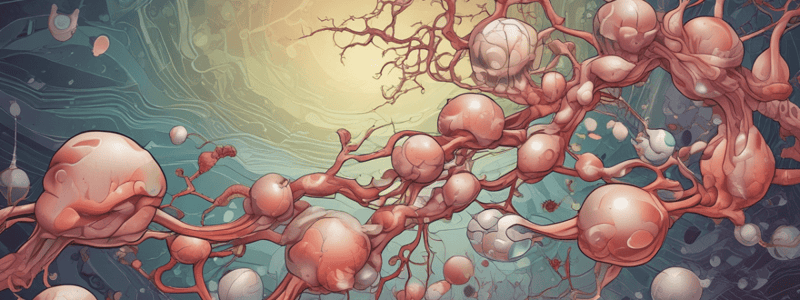Podcast
Questions and Answers
What is the term for a condition where the hypothalamic-pituitary system is altered?
What is the term for a condition where the hypothalamic-pituitary system is altered?
- Hypopituitarism
- Anterior pituitary syndrome
- Pituitary gland disorder (correct)
- Hyperpituitarism
Which of the following is a disorder of the posterior pituitary gland?
Which of the following is a disorder of the posterior pituitary gland?
- Diabetes Insipidus (correct)
- Prolactinoma
- Hypopituitarism
- Acromegaly
What is the result of increased ADH levels without normal physiologic stimuli?
What is the result of increased ADH levels without normal physiologic stimuli?
- Reduced plasma osmolality (correct)
- Normal plasma osmolality
- Variable plasma osmolality
- Increased plasma osmolality
What is the function of ADH in normal conditions?
What is the function of ADH in normal conditions?
What is the consequence of SIADH in terms of plasma osmolality?
What is the consequence of SIADH in terms of plasma osmolality?
Which of the following tumors produces prolactin?
Which of the following tumors produces prolactin?
What is the term for the syndrome of inappropriate antidiuretic hormone hypersecretion?
What is the term for the syndrome of inappropriate antidiuretic hormone hypersecretion?
What is the normal response to reduced plasma osmolality in terms of ADH secretion?
What is the normal response to reduced plasma osmolality in terms of ADH secretion?
What is the clinical manifestation of SIADH?
What is the clinical manifestation of SIADH?
What is the treatment for SIADH?
What is the treatment for SIADH?
What is the etiology of neurogenic diabetes insipidus?
What is the etiology of neurogenic diabetes insipidus?
What is the long-term complication of untreated diabetes insipidus?
What is the long-term complication of untreated diabetes insipidus?
What is the cause of panhypopituitarism?
What is the cause of panhypopituitarism?
What is the characteristic urine finding in diabetes insipidus?
What is the characteristic urine finding in diabetes insipidus?
What is the common cause of ectopic production in SIADH?
What is the common cause of ectopic production in SIADH?
What is the evaluation for SIADH?
What is the evaluation for SIADH?
What is the term for the excessive production of hormones from a non-endocrine tissue?
What is the term for the excessive production of hormones from a non-endocrine tissue?
Which of the following is an example of a secondary hyperfunction?
Which of the following is an example of a secondary hyperfunction?
What is the term for a deficiency in hormone production due to a defect in the receptor?
What is the term for a deficiency in hormone production due to a defect in the receptor?
Which of the following is a cause of abnormal endocrine function?
Which of the following is a cause of abnormal endocrine function?
What is the term for a congenital defect in the adrenal gland that leads to a deficiency in hormone production?
What is the term for a congenital defect in the adrenal gland that leads to a deficiency in hormone production?
Which of the following is an example of a primary hypofunction?
Which of the following is an example of a primary hypofunction?
What is the term for the production of abnormal hormones due to an enzyme deficiency?
What is the term for the production of abnormal hormones due to an enzyme deficiency?
Which of the following is a cause of secondary hyperfunction?
Which of the following is a cause of secondary hyperfunction?
What is the term for the excessive production of hormones from an endocrine gland?
What is the term for the excessive production of hormones from an endocrine gland?
Which of the following is an example of altered metabolism of hormones?
Which of the following is an example of altered metabolism of hormones?
What is the primary purpose of dynamic testing in the diagnosis of hypopituitarism?
What is the primary purpose of dynamic testing in the diagnosis of hypopituitarism?
Which of the following is a consequence of cortisol deficiency in hypopituitarism?
Which of the following is a consequence of cortisol deficiency in hypopituitarism?
What is the term for the condition where all hormones are deficient in hypopituitarism?
What is the term for the condition where all hormones are deficient in hypopituitarism?
Which of the following is a characteristic of proportionate dwarfism in hypopituitarism?
Which of the following is a characteristic of proportionate dwarfism in hypopituitarism?
What is the primary purpose of brain imaging in the diagnosis of hypopituitarism?
What is the primary purpose of brain imaging in the diagnosis of hypopituitarism?
Which of the following is a consequence of deficiency of FSH and LH in hypopituitarism?
Which of the following is a consequence of deficiency of FSH and LH in hypopituitarism?
What is the primary purpose of the fluid deprivation test?
What is the primary purpose of the fluid deprivation test?
What is the expected outcome in a healthy individual undergoing the fluid deprivation test?
What is the expected outcome in a healthy individual undergoing the fluid deprivation test?
What is the reason for measuring urine output every hour during the fluid deprivation test?
What is the reason for measuring urine output every hour during the fluid deprivation test?
What is the purpose of injecting DDAVP during the fluid deprivation test?
What is the purpose of injecting DDAVP during the fluid deprivation test?
What is the expected outcome in a patient with Diabetes Insipidus due to lack of AVP undergoing the fluid deprivation test?
What is the expected outcome in a patient with Diabetes Insipidus due to lack of AVP undergoing the fluid deprivation test?
What is the significance of a urine osmolality less than 300mosmol/kg after fluid deprivation?
What is the significance of a urine osmolality less than 300mosmol/kg after fluid deprivation?
What is the difference between Cranial Diabetes Insipidus and Nephrogenic Diabetes Insipidus?
What is the difference between Cranial Diabetes Insipidus and Nephrogenic Diabetes Insipidus?
Why is the fluid deprivation test performed under medical supervision?
Why is the fluid deprivation test performed under medical supervision?
Flashcards are hidden until you start studying
Study Notes
Endocrine Disorders
- Excess hormone secretion can lead to hyperfunction, which can be primary (originating from the gland itself) or secondary (stimulated by a hormone from another gland)
- Primary hyperfunction can result in hyperthyroidism, where the thyroid gland produces excessive amounts of T4 and T3 hormones
- Secondary hyperfunction can result in hyperthyroidism caused by the pituitary gland, which stimulates the thyroid gland to produce excessive hormones
Ectopic Hormone Syndromes
- Ectopic hormone production occurs when a hormone is produced outside of its normal source gland, often associated with cancer
- Examples include peptide hormone production by a tumor, which can mimic the function of a hormone produced by the pituitary or thyroid gland
Decreased Hormone Secretion
- Primary hypofunction can result in decreased hormone production, such as hypothyroidism (underactive thyroid gland)
- Secondary hypofunction can result in decreased hormone production due to a deficiency in the pituitary gland, which normally stimulates the thyroid gland
- Congenital adrenal hyperplasia is a genetic disorder that affects hormone production, resulting in a deficiency of cortisol and aldosterone
- Enzyme deficiency can also lead to decreased hormone production, as the enzyme is necessary for hormone synthesis
Defect Target Organ Receptors (Pseudo)
- Defect target organ receptors can lead to a condition where the hormone is produced normally, but the target organ is unable to respond, resulting in a pseudo-hormone deficiency
Mechanisms of Hormonal Alterations
- Abnormalities in endocrine function can be caused by elevated or depressed hormone levels, resulting from faulty feedback systems, dysfunctions of the gland, or altered metabolism of hormones
- Targets cells may fail to respond to hormones due to cell-surface receptors associated disorders, intra-cellular disorders, or circulating inhibitors
Disorders of Pituitary Gland
- Hypopituitarism is a rare disorder in which the pituitary gland fails to produce one or more hormones, or all hormones (panhypopituitarism)
- Etiology can be primary or secondary, and can be inherited or caused by a tumor, head injury, or other conditions
- Clinical manifestations include fatigue, loss of appetite, weight loss, anemia, and short stature in children
- Laboratory investigation includes blood tests, dynamic testing, and brain imaging
SIADH (Syndrome of Inappropriate Antidiuretic Hormone)
- SIADH is a condition where the hypothalamus produces excessive amounts of ADH, leading to water retention and dilution of the blood
- Clinical manifestations include hyponatremia, hypervolemia, and urine hyperosmolarity
- Treatment involves correcting hyponatremia and hypervolemia, and fluid restrictions
Diabetes Insipidus
- Diabetes insipidus is a condition where the pituitary gland fails to produce ADH, or the kidneys are unable to respond to ADH
- Clinical manifestations include polyuria, polydipsia, nocturia, and low urine osmolality
- Treatment involves hormonal replacement therapy
Hypopituitarism
- Consequences of hypopituitarism depend on the affected hormones, and can include cortisol deficiency, thyroid hormone deficiency, gonadal failure, and growth hormone deficiency
- Panhypopituitarism can result in a combination of these deficiencies
Dwarfism
- Dwarfism can result from reduced growth hormone during childhood, leading to proportionate dwarfism and short stature
- Features of body are proportionate to each other, but the rate of development is decreased
- Test to check regulation of fluid balance and power of the kidney tubules to concentrate the urine includes the fluid deprivation test
Fluid Deprivation Test
- The fluid deprivation test is used to diagnose Diabetes Insipidus and assess the body's response to lack of fluids
- The test involves fluid deprivation for a period of time, followed by injection of DDAVP and measurement of urine and blood concentrations
- Results can indicate Cranial Diabetes Insipidus or Nephrogenic Diabetes Insipidus
Studying That Suits You
Use AI to generate personalized quizzes and flashcards to suit your learning preferences.




